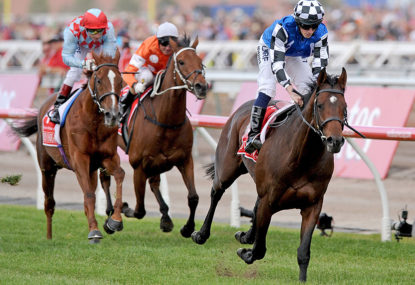'Ride of the century!' Madness as Pride of Jenni wins QE Stakes by ridiculous margin
"This is unbelievable!"

It’s Melbourne Cup Day today. Cast your mind back for a moment to the 2014 race.
Admire Radki collapsed in his stall post-race. He died of a heart attack. Seventh placed Araldo got spooked by a large Aussie flag and broke his leg in a fence. He’s humanely put down shortly afterwards; too much patriotism is bad after all.
The media went into overdrive afterwards. There were people who called for the sport to be banned. They were mocked by others who claimed these were isolated incidents; freak accidents in the otherwise lofty pursuit of horse racing. Racing Victoria quickly imposed a limit on the size of flags in what was a genius move. It was we who were at fault, not them.
Those against horse racing claimed track deaths were the norm, not an abomination. Racing directly claimed the lives of 115 horses in 2014, and this year is headed for a number around 120. Racing Victoria claimed that the deaths amount to one-twentieth of one percent of 200,000 racing starts. Both groups are right, but who you cite depends on where you stand. Let’s put it another way – if 120 cricketers, boxers or Aussie rules players died every year, these sports would be promptly outlawed.
Horse racing is a curious pastime that doesn’t obey the rules of public perception like other sports. In our professional ball sports, the actions of the players and the league are subject to public scrutiny in a way that racing identities aren’t.
In a way it’s the nature of the beast; public interest is near non-existent in racing out of season. There are two annual carnivals where we get a bit excited. There’s only one day a year when we all stop and watch.
Today is that day. On Melbourne Cup Day 2015, animal rights groups are hosting events like ‘Not the Melbourne Cup’. Terry Bailey, Racing Victoria’s chief racing steward is returning to work a week after his house was sprayed by gunfire. The bookies are lining up the mugs. We’re forgetting the sight of Kasiano Lad euphemistically breaking down in front of the Royal Randwick grandstand.
I used to think that the way forward for horse racing to improve the lot of its participants – both human and equine – was to get more people engaged in the sport. I now think that the only way is to not watch, or bet, at all.